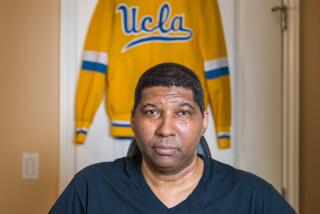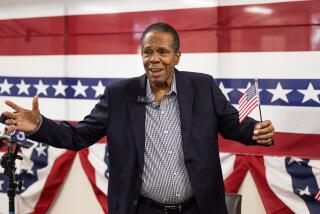Former Angels star Rod Carew opens up about massive heart attack, challenging recovery
With his 70th birthday approaching in October, Rod Carew compiled a “bucket list” last summer, “some things I’d like to do before I leave this Earth,” the former Angels and Minnesota Twins star and first-ballot Hall of Famer said.
On it is a trip to Scotland to golf the Old Course at St. Andrews and an ocean descent in a shark tank. He also wants to “jump out of an airplane,” which couldn’t be more ironic because, as Carew admits, “I hate to fly.”
That Carew could laugh at his sky-diving ambitions during a conference call Monday was something of a miracle because that bucket nearly claimed the 18-time All-Star long before he had a chance to attack his list.
After hitting his drive down the middle of the first fairway at Corona’s Cresta Verde Golf Course on Sept. 20, Carew’s chest began to burn, and his hands grew clammy. He returned to the clubhouse, crumpled to the floor and asked a woman to call a paramedic.
The next thing he knew, “There was a guy with two paddles in his hands, saying, ‘Hurry, we’re losing him!’ ” Carew said. Carew’s heart stopped beating. Twice. Both times, he was revived. When Carew woke up in the emergency room of Riverside Community Hospital, he was told he suffered a major heart attack.
“A cardiologist took one look at me and said, ‘Yep, you had a widow-maker,” Carew said. “Once this happens, you don’t survive.”
But Carew did, with the help of a computer-controlled, battery operated pump known as a left ventricular assist device (LVAD) that was surgically implanted during a six-hour procedure at Scripps La Jolla Hospital in early October.
The device, which pumps blood from the left ventricle into the aorta, is known as a “bridge to transplant,” and Carew, who spent seven weeks in the hospital and is still fatigued, hopes to regain enough strength to receive a new heart.
But as technology has evolved, patients, even those who are not good transplant candidates, are surviving longer with the LVAD, “up to five years or even more,” said Dr. Mariell Jessup, professor of medicine at the Hospital of the University of Pennsylvania and past president of the American Heart Assn.
“They’ll put me on the list and see if they can find a heart for me,” Carew said. “Otherwise, I’m going to be battery powered for a while. I’m like the bionic man.”
Carew, a .328 hitter who racked up 3,053 career hits and won seven batting titles, does not feel like a Six Million Dollar Man. He’s relied on his wife, Rhonda, and 26-year-old stepson Devon to help him with simple tasks such as using the bathroom or walking.
He is convalescing at a friend’s home in San Diego so he can remain close to his doctors at Scripps, and he is not expected to return to his Orange County home until December.
“It’s not a good feeling,” Carew said, “when you want to lay down all the time.”
But Carew has improved to a point where he was willing to open up about his heart attack and recovery for the first time and to become an advocate for heart health, much as he was for young cancer patients after his 18-year-old daughter, Michelle, was diagnosed with leukemia in 1995.
Carew, then a shy and somewhat reclusive hitting coach for the Angels, launched a campaign for bone-marrow donors, and the donor registry increased to 2 million in February 1996, up from 1.5 million the previous year.
Though a match wasn’t found for Michelle, who died in 1996, Carew remained a staunch supporter of the Leukemia and Lymphoma Society, and the night before his heart attack, he served as honorary chairman for the society’s annual Light the Night Walk at Angel Stadium.
Carew hopes to have a similar impact on heart health.
“That’s the first thing I thought about,” he said. “When my daughter passed away, I did a lot for the leukemia society. The day after [my heart attack], I thought, how can I help the heart association?”
Carew was taking medication for high blood pressure and high cholesterol, but he considered himself healthy, otherwise. Jessup, the Penn doctor, said it’s important for adults over 40 to be screened for cardiovascular disease each year, in addition to having blood pressure and cholesterol checked.
“I look at myself as healthy, but you just never know,” Carew said. “I want you to understand how fatal this can be. Get yourselves checked. Don’t wait for it to happen. Everyone looked at me like I was healthy, and I wasn’t. Bam! It got me.”
As rough as the past two months have been, Carew is filled with gratitude this Thanksgiving week. He’s gaining so much strength he plans to travel to Florida to attend the Twins’ spring-training camp in March and to Cooperstown, N.Y., for the Hall of Fame induction in July.
And he’d like to make that trip to Italy with Rhonda that the couple had to cancel after Rod’s heart attack.
“I tell you, just a big thank-you to my friend upstairs,” Carew said. “I’ve known for a long time that I’m not going to live forever, but maybe I have some things to do before He wants me to go.”
More to Read
Go beyond the scoreboard
Get the latest on L.A.'s teams in the daily Sports Report newsletter.
You may occasionally receive promotional content from the Los Angeles Times.











